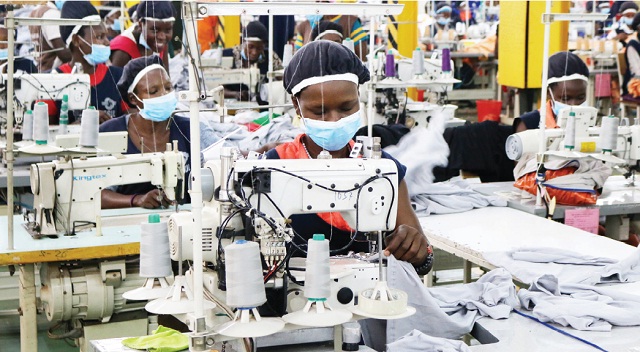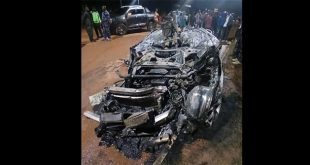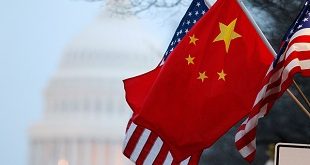
Fine Spinners plan to sell T-shirts at US$3 on the local market
Kampala, Uganda | ISAAC KHISA| It is Oct. 17, eighteen representatives of importers from Germany are touring Fine Spinner’s garment factory in Bugolobi, a Kampala suburb filming various activities and to ascertain the company’s production processes and capacity.
Later, they would proceed to Kasese, South Western Uganda, to locate the origin of the cotton raw materials used in the factory for the production of T-shirts for export.
Stefanie Sumfleth, the head of corporate responsibility and quality management of Bonprix, one of the companies importing the T-shirts from Fine Spinners told The Independent in an interview on Oct. 17 that their intention was to shoot films to show their customers.
“At the end of it all, we want to have very high quality products and that the cotton production is sustainable,” she said adding, “This is very important to us as a company but at the same time we want to support the farmers not with charity but with business.”
Ellen Goes, a corporate responsibility officer with Witt-Gruppe, a member of Otto Group, said while they are yet to import any garment from Uganda, they are considering to do so.
She said their visit was to assess the production capacity and make decisions on whether or not to import garments from the factory.
Fine Spinners, which also has operations in Kenya, produces multiple bright coloured T-shirts – pink, yellow, blue and more – for export markets mainly Germany with labels ‘Made in Uganda’ and ‘Made in Africa’. This is signalling optimism for the industry’s move to recovery.
Started in 2014 after a US$40 million investment in the textile factory, Fine Spinners took over the premises of the defunct Tri-Star group that closed more than a decade ago citing irredeemable logistical problems and loss making during its operations.
This was followed up with the acquisition of Phenix Logistics Uganda Ltd – now under construction – from the Ugandan government in March this year for the production of mélange fabrics, which are made with more than one colour of fabrics, either by using different coloured fabrics or made with different fabrics that are then individually dyed. This is aimed at product diversification to serve various market segments.
Meanwhile, in May this year, Chinese’s Sunbelt Textiles Company Limited, unveiled its USUS$18 million textile factory in Jinja, eastern Uganda, producing blankets, pillow cases and bed sheets for local and regional markets.
Jaswinder Bedi, the executive director at Fine Spinners, who also doubles as the chairman of the African Cotton and Textile Industry’s Federation, told The Independent in an interview that Uganda’s textile industry has high chances of growth due to availability of cotton countrywide.
“Uganda has been exporting most of its cotton; and we thought we could set up a factory here, utilise the raw materials and produce high quality garments,” he said. “The production cost in this market is also still lower compared with Kenya.”
He said the company currently produces 400,000 T-shirts per month for export and plans to double production in the next two years to serve both the local and foreign market.
He added that the company, which earned US$1.5million through the export of T-shirts last year, plans to sale 20 % of the production volumes to the local market at US$3 per T-shirt compared with US$10 for the same garment on the foreign market.
“We want to ensure that the local population also buys new clothes; they also deserve dignity,” he said, adding that the move is also intended to re-align with the government’s new policy of Buy Uganda Build Uganda.
This comes at the time majority of Uganda’s population are relying on second-hand clothes. At the moment, second-hand clothes account for more than 81% for the country’s clothes imports, according to Andrew Brook, in his book Clothing Poverty: The Hidden World of Fashion and Second Hand Clothes.
This is higher than what the entire Sub-Saharan Africa, where second hand clothes and shoes account for over 50% of the clothing market.
The Ugandan government and the rest of the East African Community (EAC) states are currently determined to ban importation of second hand clothes into the bloc as a measure to promote local industries amidst complaints from US traders.
In 2016, EAC, which comprises of Uganda, Kenya, Tanzania, Rwanda, Burundi and South Sudan agreed to ban imports of used clothes in the region by 2019 as part of the EAC Vision 2050 and the Industrialization Policy to enhance manufacturing sector that currently contributes 8.7% to the regional Gross Domestic Product to 25% by 2032. The move, however, could also harm a multi-billion shilling group of importers.
 The Independent Uganda: You get the Truth we Pay the Price
The Independent Uganda: You get the Truth we Pay the Price




Hello,
Good day to you!
Greetings from Ramyam Exports – India…
We would like to introduce ourselves as one of the leading exporter for Garment’s consumable materials from India. .
Our products:-
1. Sewing and printing machine accessories
2. Cutting and spreading machine spares
3. Ironing tables and box accessories
4. Electric and Electrical materials
5. Fabricated material (Tables, racks, bins, trollies, pallets, etc.)
6. Packing materials and cotton boxes
7. Paper rolls and Poly films
8. Barcode label and ribbons
9. Printing and stationery items
10. Tools and accessories etc…
We welcome your enquiries on any products to serve you with best competitive price.
One of the best solutions for the Garments.
Thanks & Regards,
U.Rajeshkumar︱Ramyam Exports︱India
Mob: +91 95006 43839︱+ 91 74488 53241
i would like to buy cuttings or material for tshirts which are sold in
kilograms that i can also make tshirts out of it preparedly blue and
red colors please let me know is we can do business
thanks
michael
—
—
10 February 2020
Re: Social Issues & East African Politics
Dear Heads of Organizations,
The problem which we are experiencing is still being investigated by God. For my part, I have to decipher what the long standing problem has meant to me, and what to do about it. The fallout includes women’s issues, such as repair of colour and supply of goods and services to women. For example, I was fought a lot about the clothes which women are permitted to wear, and that leads me to believe that the white Americans wanted to deprive me and women in general of a good supply of clothes. There is oppression over the colour blue, and that type of psychological problem has to be removed. In addition, the manufacturers of women’s clothing have to once again be able to make clothes easily, and to supply them to women in the way which they used to do. The Bukiga was the main culprit, and he fought long and hard about what women should be able to wear. I believe that he was not entitled to his quarrel, and he shall be removed. Thinking back, even at Kenya, there were hints that such a quarrel was brewing, but the main belief was that there was a cultural issue behind the problem, and so I would not be affected. Even today, I am told that I’m Mindanao, which is true, and that means that clothing is not to be a problem for me. But the problem is actually more serious than that. We are now to believe that white societies around the world are experiencing a psychological problem somewhere about women and the way in which women look. The definition of white society requires examination because of the controversy which arose when some people had their colours written for them by other people who then decided to quarrel with the rightful identification of people and tribes. It is actually wrong to permit a widespread and hidden problem about who is white or female in the world, and that is the present situation which the world is experiencing. That type of problem can lead to labour and employment problems when building factories for clothes and other items, so the problem really shall have to be fought. The white Americans, (another incorrect identification) also quarrelled as though they were entitled to institute their own type of racial politics at certain parts of the world, and that means that certain countries are vulnerable to disputes which pertain to women. It is not tolerable to continue to perpetuate a problem where women are being fought for their colour and tribal entitlements, and so we are to seriously begin to remove the dispute of just who a woman is. We are carefully moving away from a broad exposure to the problem, but there are many lingering problems. Those of us who were brought up as women who are not white expect to be able to wear the clothes of our choice, but that means that in the world, we might be fought about femininity and colour. We are occupants of this planet, and so the men of our tribes are to also design a solution to the problem. As far as factory and workplace design is concerned, we have previously mentioned the issues which took place at New York Republic when I worked at a bank. At the factory at New Jersey, the people who were called “management” were black from other countries, so we still don’t have good information about the local people. The other employees were a representation of the people, but we should go back and gather the proper type of data which is required in order to serve the societies of that continent. Here at New Zealand, public health issues are still to be solved. The behaviour of having a large group land at Auckland, and then start dispersing to Taupo, Tauranga and then to Antofagasta is not a good phenomenon. There are still questions which have to be answered.
Sincerely,
June Wanjugu Akena Sheremetyevo Opeto Selassie
13/88 Nelson St.
Auckland Central, Auckland
New Zealand.
Am a Kenyan and experience mechanic I can repair more than 6type of machines.namely
Overlook
Single needle
Flat lock
Double needle
Cutting machine
Feeding of the arm FOA}`
Chain machine.
Hi , I am Sonia and just had a chance to eead this article. I would like to find out whether you have similar access to articles pointed towards the fashion industry in Uganda preferably teen fashion.
Dear Sir/ Madam,
Can you supply any of this product T-shirt , Drilling pipes, Sanitizer, Towel by contract?
Hi
Im saliya jayasinghe .from sri lanka hear im im doing business promotion orders .mean t shirt .cap .bag i can handle cutting to packageing .